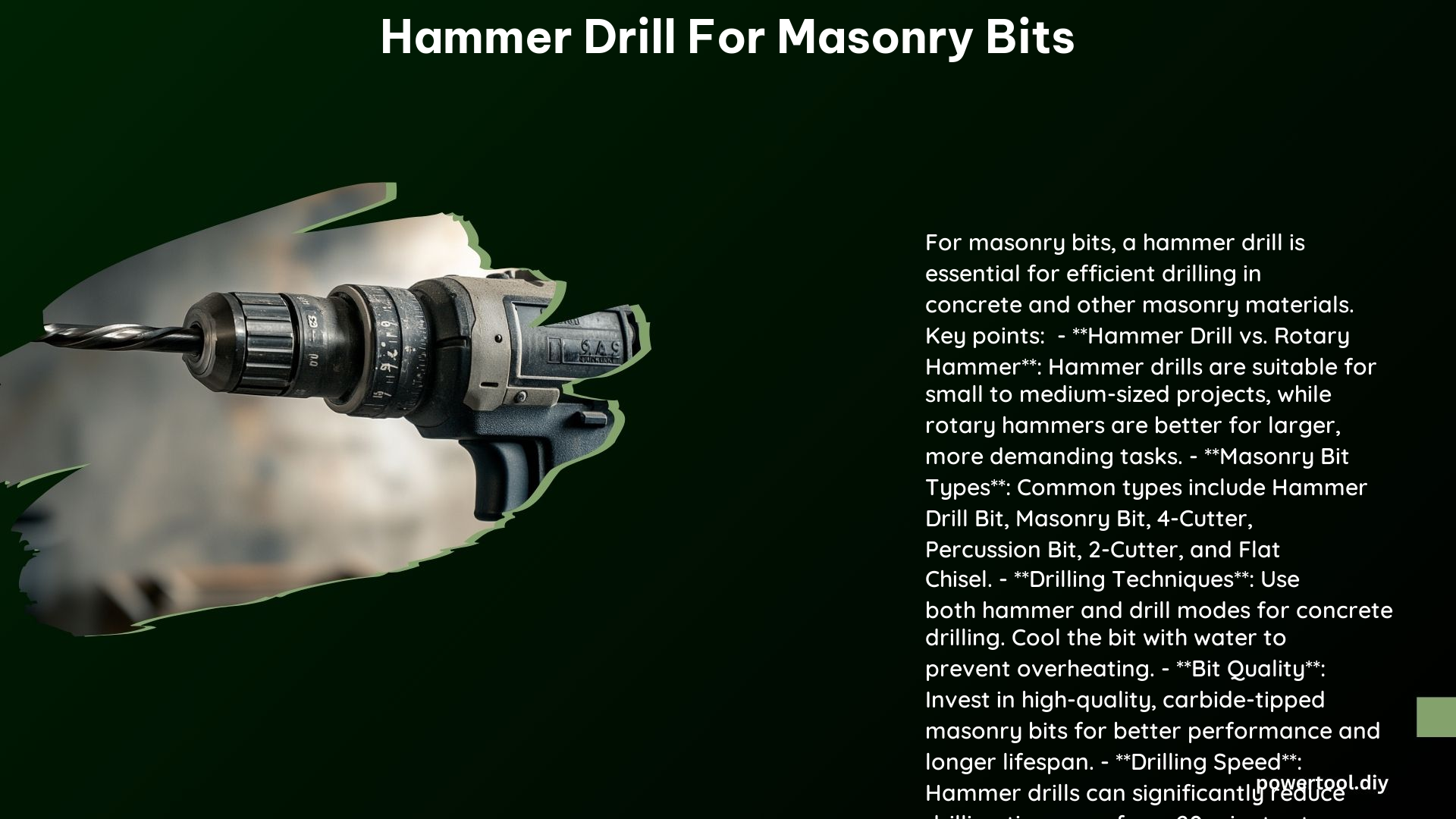When it comes to drilling into concrete, masonry, or asphalt, a hammer drill with the right masonry drill bits is essential for efficient and effective results. This comprehensive guide will cover the key aspects of hammer drills and masonry drill bits, including the best types for drilling large holes, preventing overheating, and technical specifications to help you achieve professional-grade results in your DIY projects.
Types of Masonry Drill Bits
SDS-Plus Bits
SDS-Plus bits are designed specifically for use with rotary hammers and are ideal for drilling into concrete and masonry. These bits feature a carbide-tipped design that provides exceptional durability and are available in a wide range of sizes, from 1/4 inch to 1 inch in diameter.
The SDS-Plus shank design allows the bit to be easily inserted and removed from the hammer drill, and the carbide tips are engineered to withstand the high-impact forces generated by the hammer action. SDS-Plus bits are known for their ability to drill through tough materials quickly and efficiently, making them a popular choice for professional contractors and DIY enthusiasts alike.
Hammer Drill Bits
Hammer drill bits are specifically designed for use with hammer drills and are suitable for drilling into masonry and concrete. These bits come in various types, including:
- 4-Cutter Bits: These bits feature four cutting edges and are ideal for drilling clean, precise holes in concrete and masonry.
- Percussion Bits: Percussion bits are designed to withstand the high-impact forces of a hammer drill, making them well-suited for drilling through tough materials like brick and stone.
- 2-Cutter Bits: 2-cutter bits are a more budget-friendly option and are suitable for lighter-duty drilling tasks in masonry and concrete.
- Flat Chisel Bits: Flat chisel bits are used for chiseling and breaking up concrete or masonry, rather than drilling precise holes.
When selecting a hammer drill bit, consider the specific material you’ll be drilling and the size of the hole you need to create. Choosing the right bit for the job can make a significant difference in the speed and efficiency of your drilling tasks.
Drilling Large Holes in Concrete

For drilling large holes in concrete, it is recommended to use a rotary hammer with a carbide-tipped masonry bit. These bits are designed to handle the high torque and impact required for drilling large holes efficiently.
Rotary hammers, also known as SDS-Plus or SDS-Max hammers, are powerful tools that combine rotational drilling with a powerful hammering action. This combination allows them to drill through concrete, brick, and other masonry materials with ease, making them the ideal choice for large-hole drilling applications.
When using a rotary hammer for large-hole drilling, it’s important to select a bit that is specifically designed for the task. Carbide-tipped masonry bits, typically available in sizes ranging from 1/2 inch to 1-1/2 inches in diameter, are engineered to withstand the high-impact forces and provide efficient, clean drilling results.
Preventing Overheating
One of the common challenges when drilling into concrete or masonry with a hammer drill is the potential for the drill bit to overheat, which can lead to decreased performance, premature wear, and even damage to the bit or the drill itself.
To prevent masonry drill bits from overheating during prolonged use, consider the following strategies:
Cool with Water
Continuously cooling the drill bit with water, especially in outdoor situations where the bit may be exposed to direct sunlight, can help dissipate heat and extend the bit’s lifespan. This can be achieved by using a water-dispensing attachment or regularly pausing to dip the bit in a container of water.
Dip in Water
Another effective method for preventing overheating is to frequently dip the drill bit in water during the drilling process. This helps to quickly cool the bit and prevent it from reaching dangerously high temperatures.
It’s important to note that while cooling the bit with water can be beneficial, it’s crucial to ensure that the drill and any electrical components are not exposed to excessive moisture, as this can lead to safety hazards or damage to the tool.
Technical Specifications
When selecting a hammer drill for use with masonry drill bits, consider the following technical specifications:
Power
Look for a hammer drill with sufficient power, typically measured in amps. For most concrete and masonry drilling tasks, a hammer drill with at least 7.5 amps of power should provide the necessary performance.
Mode Options
Ensure the hammer drill you choose has both ‘drill’ and ‘hammer’ modes. The ‘drill’ mode is used for standard drilling tasks, while the ‘hammer’ mode activates the hammering action required for drilling into concrete and masonry.
Bit Compatibility
Choose a hammer drill that is compatible with the type of masonry bit you need, such as SDS-Plus or SDS-Max. This will ensure a secure and reliable connection between the drill and the bit, allowing for optimal performance and safety.
Additionally, consider factors like the drill’s speed range, torque output, and ergonomic design to ensure a comfortable and efficient drilling experience.
References
- https://www.drillbitwarehouse.com/product-category/concrete-asphalt-masonry-drill-bits/sds-plus-drill-bits/
- https://diy.stackexchange.com/questions/250617/why-can-t-my-hammer-drill-drill-a-hole-in-concrete
- https://www.reddit.com/r/Tools/comments/w5bpoo/do_i_need_a_hammer_drill_to_drill_concrete/
- https://www.homedepot.com/b/Tools-Power-Tool-Accessories-Drill-Bits-Masonry-Drill-Bits/N-5yc1vZc23f
- https://www.homedepot.com/b/Tools-Power-Tool-Accessories-Drill-Bits-Masonry-Drill-Bits/Hammer-Drill-Bit/N-5yc1vZc23fZ1z0mt34
